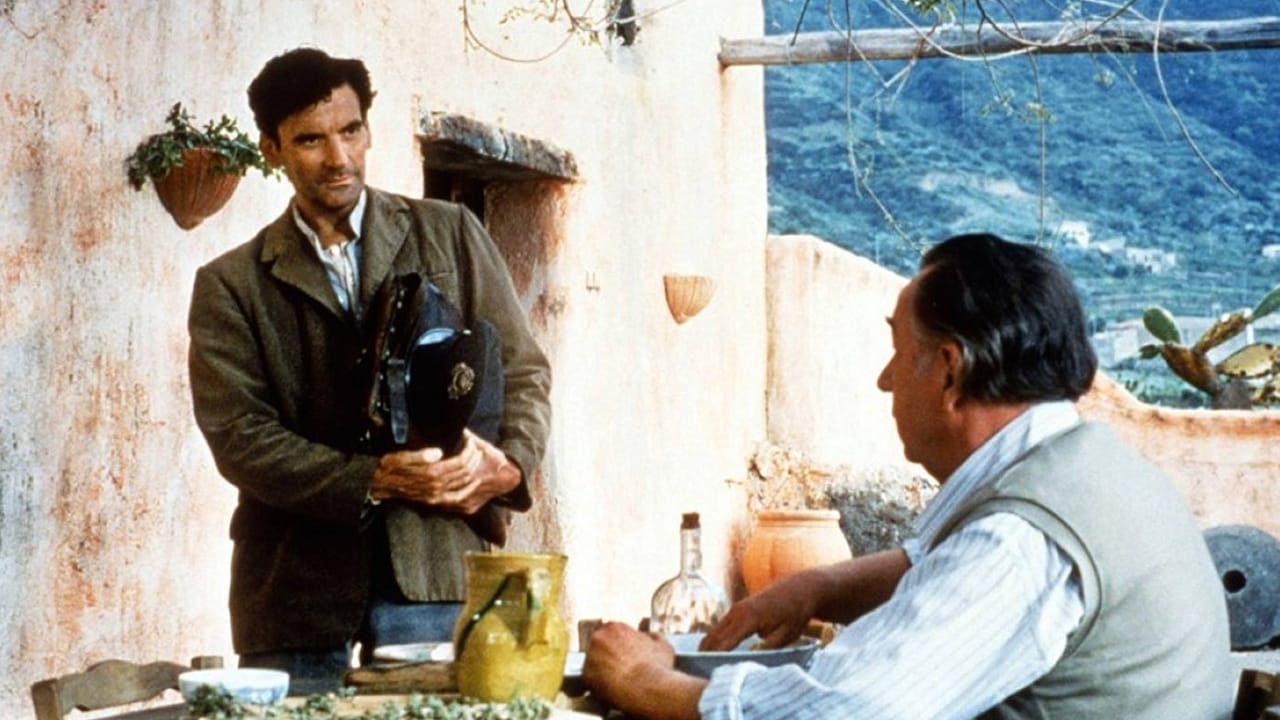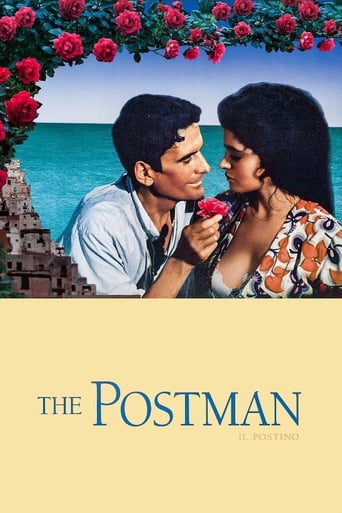



Very well executed
I didn’t really have many expectations going into the movie (good or bad), but I actually really enjoyed it. I really liked the characters and the banter between them.
View MoreThe movie really just wants to entertain people.
A clunky actioner with a handful of cool moments.
Although "Il Postino" simply means "The Postman", and although the film was at one time screened as "The Postman" in Britain, it is now generally known in English by its Italian title to avoid confusion with Kevin Costner's post-apocalyptic epic from three years later. It is loosely based upon the novel "Ardiente paciencia" by the Chilean writer Antonio Skármeta, although it transfers the action from Chile to Italy. It takes as its starting-point the fact that in the early 1950s the famous Chilean poet Pablo Neruda, in exile from his homeland for political reasons, spent some time on the island of Capri. The film, however, is not set on Capri but on an unnamed Italian island. A young fisherman named Mario Ruoppolo applies for a job as the island's postman. As he owns a bicycle and is one of the very few islanders who can read and write he is accepted and is told that he will only have one customer, Neruda himself, as because of the low levels of literacy on the island nobody else ever receives any mail. (Were standards of education really so low in fifties Italy?)Although Mario has never previously heard of Neruda, and certainly has never read any of his poems, a friendship gradually grows up between the two men. Although Mario has had little formal education he is clearly an intelligent and sensitive man, and Neruda reads him some of his poetry (in Italian translation), teaching him about literary concepts such as metaphors. With Neruda's help Mario woos the beautiful Beatrice, a village girl with whom he has fallen in love, stealing some of the older man's love poems and passing them off as his own in order to win her affections. My one criticism of the film would be that it is too sentimental about Communism, but that is perhaps only to be expected of a film from Italy, a country which at one time had the largest Communist Party in Western Europe. (In the seventies they used to win around a third of the popular vote, at a time when the British Communist Party generally consisted of three old men and a dog). Pablo Neruda is here portrayed as a kindly, idealistic gentleman, but in reality, during the forties and early fifties, he was a Communist hardliner who enthusiastically defended Stalin's dictatorship in the Soviet Union. After Khrushchev's 1956 "secret speech" he was to criticise the Stalinist cult of personality but this was due less to a change of heart than to a desire to align himself with the new official Soviet party line. He was also, at the time of his Italian exile, around twenty years younger than the character portrayed here by Philippe Noiret. Its politics aside, however, "Il Postino" is in many ways an excellent film. There is some attractive photography of the Italian coastal scenery and a great musical score by Luis Enríquez Bacalov. What really makes the film stand out, however, are the two great performances from Noiret and from Massimo Troisi, who tragically died of a heart attack soon afterwards, as Mario. There is also a good performance from the lovely Maria Grazia Cucinotta as Beatrice. Troisi received a posthumous Oscar nomination for "Best Actor", but lost out to Nicholas Cage in "Leaving Las Vegas"; as I have never seen that film I am unable to comment on the justice of that decision. I felt, however, that it was unfortunate that there was no nomination for Noiret either as "Best Actor" or "Best Supporting Actor". Indeed, this is one of those films which make me feel that it should be possible to nominate two actors for a joint award, as Noiret and Troisi combine together so well that their joint contribution seems greater than the sum of its two parts. This is the story of a touching relationship between two men of different generations, of different nationalities, of different levels of education and of different outlooks on life who are nevertheless united in friendship. 8/10
View MoreHaving just visited the opera version of this film IL POSTINO by Daniel Catan courtesy of PBS Great Performances it is rewarding to return to the original source to honor the nidus for the inspiration for the opera. Directed by Michael Radford the film relates the heartwarming story of Mario (Massimo Troisi), a gentle and simple postman who falls for the beautiful café waitress Beatrice (Maria Grazia Cucinotta) from his village, but is too shy to speak to her. He meets the famous Chilean poet Pablo Neruda (Phillipe Noiret), and, as their friendship develops, the postman's own inner poet awakens. Soon he is able to win the love of Beatrice and even stand up for and express his own beliefs.This is a simple story graced by sensitive performances: of not the actor Massimo Trosi died from heart failure on the last day of production of the film. It is possibly this knowledge of the loss of one of Italy's best comedic actors along with the clarity and transparency of the film's gentle message about love and art that has made it a cult film. At any rate this is a film that belongs in every movie lover's library. Grady Harp
View MoreI only heard of this movie on the TV game show 'Who Wants to be a Millionaire?'. The question was which one of 4 mentioned actors starred in the films 'Nuovo Cinema Paradiso' and 'Il Postino'. I hadn't heard of 'Il Postino' before, but I knew that Philippe Noiret stars in 'Nuovo Cinema Paradiso', so I already knew the answer. The presenter recommended the person who wrongly answered the question to watch these 2 movies because something changes inside us once we get to see these 2 films.Then I did research on this motion-picture. It sounded promising, even more so by being foreign. I also got to know the sad story of Massimo Troisi, who played the title's postman (Pablo Neruda's postman). The man suffered from heart disease since a long time ago. He knew about his fragile heart condition and knew he needed treatment, but despite this he wanted to do the movie anyway. He even postponed heart surgery so that he could complete the film. That was a brave move. And he did manage to finish the movie just in time. Only 12 hours after completing the film he died of heart attack. You can say that he gave his life to make this film.Massimo Troisi is great as Mario Ruoppolo, the postman. But it's also sad to see him in this film because we are looking at a man who was dying while making it and that he died almost immediately after completing it.Phillipe Noiret is great as the chilean poet Pablo Neruda. While Pablo Neruda existed for real, his friendship with the postman didn't. But I don't know if a postman named Mario Ruoppolo existed in real life or not and if he was Pablo Neruda's postman or not.The film's got beautiful cinematography and soundtrack, which gives it more emotion and beauty. The plot is, in concept, good. But the movie itself lacks something (perhaps more emotion is one of those things it lacks) and is even a little too-slow paced. It's not a bad movie. It's interesting, moving, pretty to view... a good attempt, just not quite top material. It just isn't as great as it reputation suggests (with, of course, all due respect in memory of our friend Massimo Troisi).
View MoreI had never seen this film before but recently saw it as part of a library film series. Directed by Michael Radford it earned five Academy award nominations and won Best Original Dramic Score for Luis Enriquez Bacalov. This was a low budget film but went on to become the highest grossing non-English language film for a long time. shot on location on the Italian islands of Salina and Procida and wonderfully photographed by Franco Di Gialomo this is the story of an unemployed and unmarried man Mario Ruoppolo (Massimo Troisi) reaching middle age years and is offered a small job as a postman with only one customer, the exiled Chilean communist poet Pablo Neruda (Phillipe Noiret) who is staying on the island. Mario and Pablo develop a warm friendship which leads a new confident Mario into writing poetry himself to woo local beauty, the barmaid Beatrice Russo (Maria Grazia Cucinotta). Basically a two actor film with a great cast in Troisi, Noiret and Cucinotta with great support in small roles from Linda Moretti as Neruda's mistress Donna Rosa and Renato Scarpa as Mario's boss. Nice costume design by Gianna Giss and production design by Lorenzo Baraldi. A fictionalized account of a brief 1952 stay on the island of Capri by Neruda written by Radford, Troisi, Furio and Giacomo Scarpelli and Anna Pavigano from a story by Antonio Skármeta set in Argentina during Neruda's exile there. This is a touching story and very well rendered. It is visually artistic and dramatically poetic with touches of smart, light comedy. It is painful to watch knowing that it's star, Troisi, filmed this against doctor's orders and ultimately ended up dying of a heart attack immediately after the principal filming. You can see him sweating in almost every scene even when he is not riding his bicycle and none of the other actors are sweating. For his health the director should have shut down or slowed production or recast him. A lot of work went into this for a small film and it paid off on the screen and at the box office. I would recommend this and give it an 8.5 out of 10.
View More